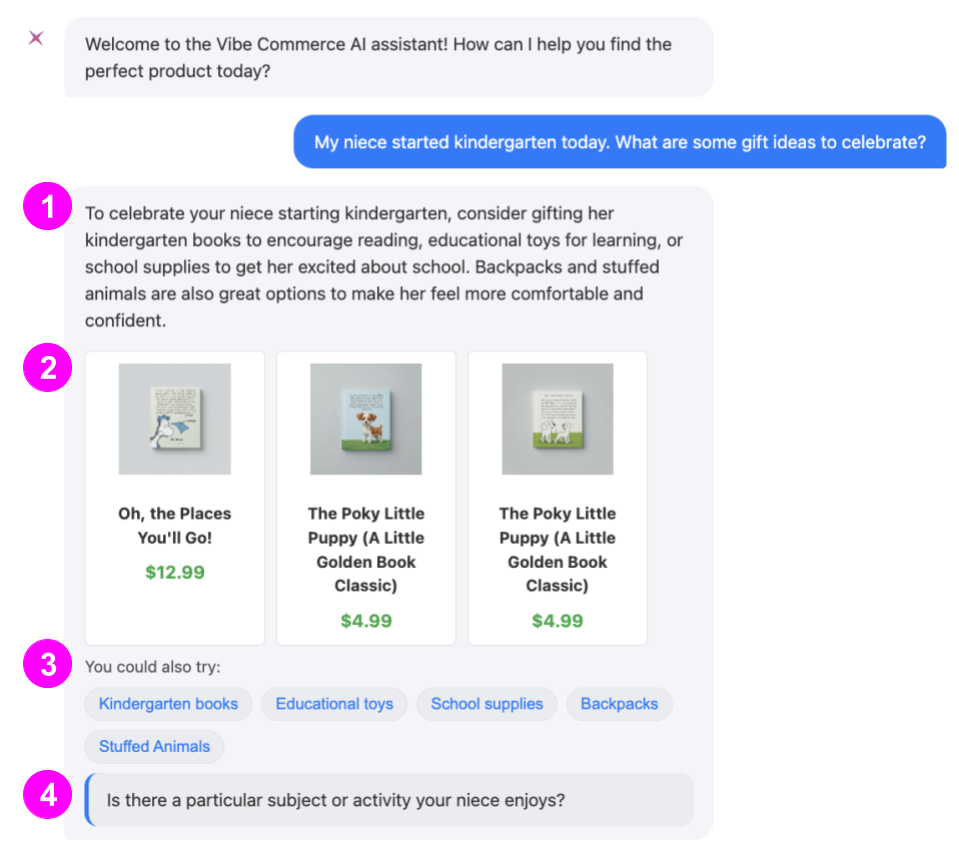Retailers are losing revenue and customer loyalty because traditional keyword search fails to deliver the personalization shoppers now expect. Google’s Conversational Commerce agent in Vertex AI Search for Commerce addresses this gap by replacing the static search bar with an interactive, AI-powered dialogue. From understanding customer intent and surfacing relevant products and recommendations, this enables retailers to boost conversion rates, reduce cart abandonment and keep up with the expectations of their most demanding customers.

The conversation begins
The interaction above is more than just a chatbot. It’s a glimpse into the future of retail. A customer arrives not with a specific product in mind, but with a need: a birthday gift for their niece.
Instead of presenting a generic grid of products, the AI assistant engages. It identifies a few ideas for age-appropriate toys and asks clarifying questions to understand the nuances of the customer's needs ("what type of book or toy would your niece enjoy?"). Based on the customer's response ("She really likes Bluey"), the assistant doesn't just filter a list; it provides tailored recommendations —a plush toy, action figures, or more interactive Bluey-themed toys—and presents a curated list of top-rated products from its catalog that fit the criteria.
This is not a search query. It's a guided consultation. And it's the experience modern customers are beginning to expect.
From monologue to dialogue
For years, the primary challenge in e-commerce was moving beyond simple keyword matching. Vertex AI Search for Commerce transformed how customers find products by introducing deep Natural Language Understanding (NLU), allowing retailers to finally comprehend the intent behind long-tail, complex queries. The search bar got smart.
But even the most intelligent search is still fundamentally a monologue: a customer asks, the system returns results. The journey lacks the dynamic back-and-forth of a real-world shopping assistant. What if you could refine your search without starting over? What if the storefront could ask clarifying questions or suggest a better alternative?
This is the leap forward offered by Conversational Commerce. It builds upon a strong foundation of NLU to create a true dialogue. It's the next iteration of this transformation, designed not only to understand a customer's initial request but to engage them in an interactive conversation of refinement and suggestion.
The high cost of a silent storefront
The gap between customer expectations and the reality of most online experiences is widening. A 2021 McKinsey study found that 75% of consumers want brands to make it easy for them to navigate their online experience, and 67% expect relevant product recommendations.
The cost of failing to meet these expectations is staggering. According to Google research, only 1 in 10 consumers report finding exactly what they're looking for with legacy keyword search. This friction has severe consequences: 94% of U.S. consumers have abandoned a shopping session due to irrelevant results, and 85% of consumers view a brand differently after just one unsuccessful search.
To combat this, many retail technology teams are stuck on a manual treadmill, constantly trying to override, curate and re-rank results to compensate for poor-quality search. This creates a brittle system reliant on human intuition rather than data-driven performance and is an unsustainable way to manage ever-larger and faster-moving catalogs.
From theory to tactical: Real-world use cases
Conversational Commerce isn't a futuristic concept. It's a practical tool that drives tangible business outcomes today. Consider these use cases:
- AI concierge: For high-consideration purchases like furniture or fashion, an agent can guide a customer through a query like, "Help me update my wardrobe for my new job," asking about dress codes and style preferences to find the perfect look.
- The expert product advisor: For complex domains like electronics or auto parts, an agent can answer, "What's a good jacket for hiking in a rainy climate?" and recommend products based on technical attributes like waterproofing and breathability.
- The "recipe-to-cart" assistant: For grocery and consumer packaged goods (CPG), a customer can simply say, "I need the ingredients for lasagna," and the AI can populate their cart with the necessary items, perhaps even asking if they prefer a certain brand of sauce.
The business impact is direct: increased conversion and Average Order Value (AOV) by effectively narrowing thousands of products to a relevant few, enhanced customer loyalty through hyper-personalized recommendations and a rich source of zero-party data from direct customer interactions.
Deconstructing the conversation: The agent in action

The Conversational Commerce agent facilitates this multi-turn, stateful experience. Let's break down the core components of a typical interaction to see how it works:
-
The conversational answer: The initial text response from the AI demonstrates advanced Natural Language Understanding (NLU), allowing the agent to comprehend the user's intent — not just keywords — and provide a helpful, human-like answer grounded in the product catalog.
-
The product recommendations: Specific products are displayed with images, titles, and prices. This is AI-driven product discovery in action. The agent automatically surfaces relevant items that match the context of the dialogue, immediately turning the conversation into a transactional shopping experience.
-
The suggested prompts (refinement chips): Clickable buttons that suggest ways to narrow the search ("kindergarten books," "educational toys"). This showcases the agent's predictive assistance capability, guiding the conversation and making refinement faster and more efficient than typing a new query.
-
The follow-up question: A clarifying question the AI asks to gather more details ("What are some of her interests?"). This is the heart of hyper-personalization. By asking for more information, the agent can tailor future recommendations to be even more relevant, increasing the likelihood of finding the perfect product.
The Google Cloud advantage: An AI-first architecture
This level of sophisticated interaction is only possible because of the underlying AI-first architecture.
- Built on a decade of search DNA: Vertex AI Search for Commerce is built from the ground up, leveraging Google's largest shopping datasets, knowledge graphs and over a decade's worth of user query and click-through data. Valtech’s customers seamlessly inherit Google's deep understanding of how users search, interact with and purchase products.
- A fully-managed, revenue-optimized engine: This is not a single model but an AI system powered by an ensemble of over 14 AI models (including four vector models). It is highly tuned for commerce with specific adaptations for catalog augmentation using Vision AI and AI-driven relevance and ranking designed to maximize revenue, not just match keywords.
- A new philosophy: "Trust the AI": We encourage enterprises to move away from the old model of endless manual rules. Start with the AI, which learns from real-time performance data and then add business rules and optimization controls as needed, not as a first resort. This reduces manual effort and allows the system to scale.
- Constant innovation: The platform benefits from continuous innovation in Google Search and AI, including foundational upgrades to our large language models (LLMs) for relevance and revenue grading.
Want to learn more?
The evolution of e-commerce is moving from a product-finding utility to a customer-centric service. The most impactful AI goes beyond just thinking to act and interact. The technology to build a truly interactive, intelligent storefront is here. The future of commerce isn't just personalized. It's conversational.







